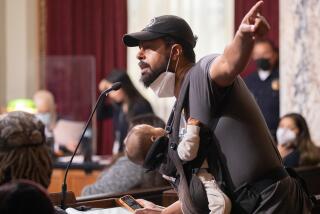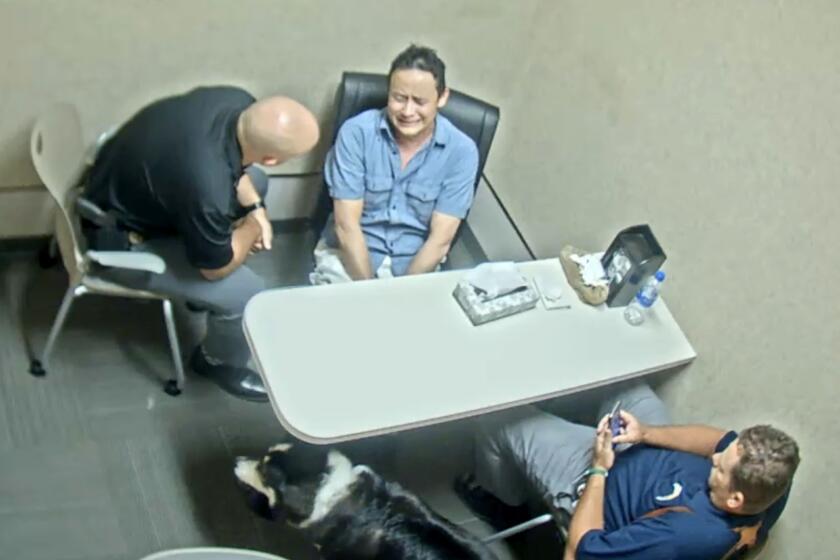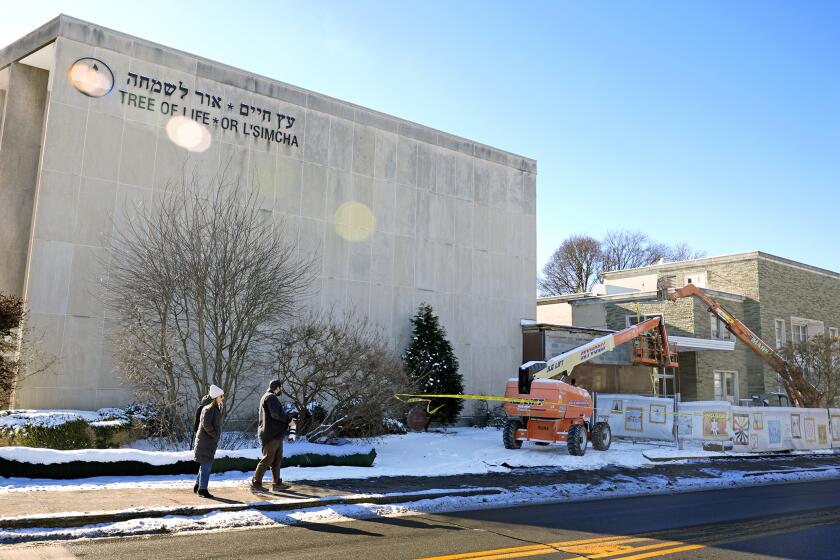Citing Threats, Holden Has 2nd Home Out of City
For much of the past year and a half, Los Angeles City Councilman Nate Holden has lived outside the city limits in Marina del Rey because he said he fears for his life.
Holden said that continuing fears, based on anonymous death threats received in April, 1991, also led him in part to refuse to vote last week on the proposed settlement of Rodney G. King’s civil lawsuit against the city. “You never know who you’re going to tick off,” he said.
Holden, 64, said he began dividing his time between a condominium he owns in the marina and his modest home in Southwest Los Angeles after receiving three anonymous threats during the turmoil that followed the King beating.
“If I’m going to be a target, I’m going to be a moving one,” said Holden, a two-term councilman who says he plans to run for mayor. “Unless you’ve been in this position, you can’t understand what it’s like.”
Although the threats stopped 17 months ago, the councilman said he still has concerns for his safety and keeps a bulletproof vest handy.
Holden said he walked out of an executive session of the City Council last week to avoid voting on a $1.75-million settlement offer to King. The council approved the settlement proposal by a 9-3 vote but the offer was rejected by King’s attorney, who wanted a $6-million settlement of the suit alleging excessive use of force by Los Angeles police officers.
Holden said he did not participate in the vote partly because the council was making a “low-ball offer” that might anger some segments of the community.
Several other council members said they have received threats over the years, and at least two others received threats during the King controversy. But council members and aides said the threats were usually not reported to police and no extraordinary security measures were taken.
“Threats (against public officials) are not that unusual,” said police spokesman Cmdr. Robert Gil.
As long as the King case remains a volatile issue, Holden said he intends to stay “periodically” in the marina complex, which has 24-hour security. But he said he will maintain his legal residence in Los Angeles, as all elected city officials are required to do.
In the emotionally charged climate that developed after the March 3, 1991, beating of King, Holden supported former Police Chief Daryl F. Gates.
On April 5, 1991, Holden was one of 10 council members who voted to reinstate Gates after the chief had been placed on administrative leave by the Police Commission.
A police report filed four days later said that “unknown suspects made death threats against . . . Holden” on the day of the council action. Circumstances of the threat were not described.
Holden or members of his staff soon reported two more threats.
On April 11, an anonymous caller to Holden’s office said two police officers and a councilman would be dead in a week “and the blood will be on your hands,” the police report said.
On April 29, a caller said that despite security measures, the councilman is “going to be dead anyway,” the police report said. A Holden aide told police the caller sounded like the one who made the April 11 threat.
No one was apprehended.
During the same period, Holden said, four plainclothes LAPD officers approached him in council chambers, warned him that “reliable informants” said his life may be in danger and whisked him outside.
“The police . . . surrounded me and said, ‘You are on the hit list,’ ” Holden said. “I felt like fainting. I had death threats before but not like that.”
Police officials said they could not verify the details of Holden’s account but that the councilman had been provided with protection for about a week last year. A spokesman declined to disclose the dates that security was provided.
The councilman, however, said two officers protected him “for months,” though he said he could not recall precisely when the protection began or ended. The officers, he said, met him in the morning, stayed nearby during the day and escorted him home at night.
One day, after someone apparently had tampered with a crawl-space door at Holden’s Crenshaw district home, the police escorts recommended that he temporarily relocate, Holden said.
“They said, ‘Until this thing blows over, is there someplace you can go?’ ” he recalled.
When Holden moved to his marina condominium, the officers continued to provide security, he said. Neither Holden nor police alerted the county Sheriff’s Department, which patrols the marina.
Police spokesman Gil said police escorts for Holden were stopped because “there were no more threats. We didn’t see anything to justify us continuing in our effort.”
Gil said it would not have been unusual for police to suggest that Holden “temporarily relocate for peace of mind. . . . Most people will relocate to a motel.”
Holden said he could be placed in danger by a number of upcoming events, including verdicts in the civil rights trial of four officers in the King beating and the criminal trial of three men accused of beating trucker Reginald O. Denny.
He said that at one point he applied to the Police Commission for a permit to carry a concealed firearm, but later said he did not complete an application and may have only made a telephone inquiry.
Since 1987, Holden has represented the 10th Council District, centered in the Crenshaw area and taking in parts of Koreatown and the Mid-City area.
Holden’s marina condominium, which records show was purchased on Nov. 1, 1989, for $238,000, is about five miles away from his Crenshaw neighborhood.
The councilman said he immediately furnished the condo as a vacation home but “did not spend even one night there” for the first year or two and has never rented it out.
“I’ve got a right to my place in the sun like anyone,” said Holden of the complex with tennis courts, swimming pools, saunas and shops overlooking the yacht harbor.
At various times in interviews, Holden said he lived in the marina “periodically,” and at others acknowledged he stayed there “most of the time.” At one point, he said, “I can’t go back to (the Los Angeles residence) until we get Rodney King behind us.”
City elected officials are required by law to reside in the city, and council members are required to reside in their current districts.
The City Charter and city election code require candidates for mayor and City Council to reside in the city at least 30 days before the first day of filing for office. Residency is defined as a place “in which habitation is fixed and to which, whenever (a candidate) is absent, he has the intention of returning.”
In 1987, a citizens group unsuccessfully challenged the residency of Holden and two other 10th District candidates. Holden, a longtime resident of the unincorporated area of Ladera Heights, had rented a small garage apartment in the 10th District a few months before the election.
Holden said his legal residence is now the three-bedroom home in the Crenshaw area that he purchased in 1988 for $170,000. He receives mail and has a telephone there. Neighbors say they regularly see him driving to or from the house, but do not know whether he spends the night there.
On two consecutive weekdays last week, Times reporters encountered Holden at the marina--once as he headed to a City Council meeting, once after a workout in the condo’s health club.
“I spend some time here,” he said. “I spend some time there (in the district). I don’t think it makes any difference, as long as my legal residence is where it’s at.”
Holden said he likes the marina because “you’re out of town, but you’re really not out of town. It’s an out-of-town, in-town kind of facility. You can get rid of all the stress. . . .
“You can really sort of round off your life when you’re under the gun.”
Councilman Holden’s Abodes
After receiving death threats a year and a half ago, Los Angeles City Councilman Nate Holden has lived much of the time in a Marina del Rey waterfront condominium. Holden represents the 10th Council District in Southwest Los Angeles, below.
The condominium is outside the city limits but Holden says his legal residence is a home he owns in the Crenshaw area of his district, about five miles from the condo.
He says he divides his time between the dwellings for safety reasons.
More to Read
Start your day right
Sign up for Essential California for news, features and recommendations from the L.A. Times and beyond in your inbox six days a week.
You may occasionally receive promotional content from the Los Angeles Times.






